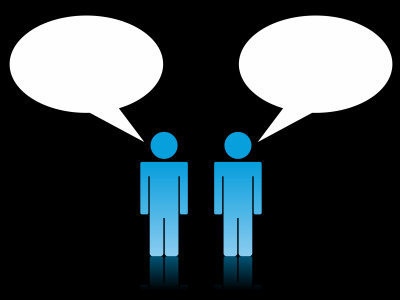10 points for smooth communication with the other party

For example, when consulting someone, if the other party intercepts his story or advices not asking for anything, I think that everyone is irritated and troublesome.
It is easy to condemn such a person, but the conversation is made up of the interaction of the person and the other person. So, in order to communicate smoothly with someone, your way of responding is also highly relevant.
What I will introduce from now is the 10 tips to successfully communicate with other people who have troubled themselves because they can not catch conversation successfully with acquaintances, as a lesson learned from those experiences. If you keep these in mind, you may be able to communicate more smoothly with people a bit more than now.
Details are as below.10 Keys To Be A Becoming a Better Communicator - by Dumb Little Man
1: Accept what others say

It is a good thing to start communicating with your opponent with a clear goal but let's focus on your goals so that you do not ignore the message your opponent is emitting. You should not expect that the answer you expect will come back.
Even if it is criticized by the other party, it is important to accept that criticism. Many people would like to dispute as soon as they are criticized, but doing so will miss valuable advice in criticism. Rather than receiving a criticism of a personality, it is good to think "what the hell is letting the other party say this" and look for the message in it?
2: Read the meaning of the word

There is meaning to the basics of communication. Communication failure between people and people, especially males and females, seems to originate from the fact that they received what they said as their face value and did not take away the meaning of the word. Please also pay attention to body language including hand movements, speed of speaking, tone of voice and so on. The important point of communication is often casually expressed, so it is important not to miss it.
3: Being positive

For example, a person of negative thinking is critical all the time, pointing out very small errors at random, and continuing to talk about the problems they have found pinpoint. Therefore, people listening are disgusted. Positive people, on the other hand, have a positive impact on the surroundings. Let's focus not only on the minus side but also on the plus side.
4: Pays respect for the opponent

Just paying respect to your partner makes communication much more smooth. To not pay respect to the other party is transmitted to the other party from the end of the conversation. Let's start with recognizing the background, expertise and ability that your opponent has. Even if you are a colleague you dislike, it is important to acknowledge what he or she has done.
5: Talking with your eyes as close as possible

To look at the eyes of the speaking people is a very good way to tell the other party "I am listening to your story." However, you do not have to keep seeing your eyes all the while speaking. Send eye contact at the timing when the other person lifts his face and try nodding from time to time.
6: As long as there is nothing wrong, I do not obstruct the story of the other party

Let's not interrupt the story of the other party when it is unnecessary. From the context of the story, I think that there are times when the opponent knows what to say next time, but that may be out of expectation. You'd better listen to your story as much as possible.
Also, I think that there is a scene where there is a tremendous talk with someone who is terribly strange, but at such times in the first few minutes of the beginning of the talk, let the opponent draw out what he wants to say and let him finish talking. If your opponent's response is getting lazy longer, there is a possibility that the talker stuck in the pattern of his own conversation and the direction of the talk disappeared. Let's support your opponent so that the conversation goes to the correct end point.
7: Ask questions to others

In the English-speaking old proverb, there is a thing called "when you assume, you make an ASS out of U and ME" (making guesses makes you look stupid). Let's not think that having passed to a person called X, for example, will also pass for people Y. Once you've forgotten your way of doing things that you've made up of your experience, try exploring a whole new way of communicating.
If you have any doubt about what the other person is saying, I will ask you about further details. Before you make a conclusion, let's grasp the facts evenly. By putting in a habit of asking questions every time your opponent speaks, you will be able to understand what the other person is saying correctly.
8:MirroringTo

Mimicking in the psychological terms is to mirror the actions and facial expressions of the conversation partner, respiration, remarks and so on, is said to be close to a strategy for smoothly progressing the talk rather than the tips of communication It may be possible to say. So be careful not to depend on mirroring too much or go excessively. 100% It is fun to imitate someone else and it makes me look like a human being without it.
When mirroring properly, it helps to make it suitable for communication. If you have the opportunity to talk with someone next, please try to imitate the movement of the partner who is doing the best. If your opponent is sitting in front of yourself, try to be as close as you can. Also, let's smile back when you smile. By doing so, you can urge your opponent to open your heart to yourself.
9: Ask the correct questions to bring out the correct answer

All conversations are composed of "question" and "answer". Therefore, it is no exaggeration to say that the direction of conversation and the contents of "answer" depend on the quality of "question".
There are three major patterns of questions, the first is "open questions" to use when you want to share information about something with the other, such as "What happened?", The second one , "Probing questions" asking pinpoint on specific topics such as "What are you dissatisfied with?", And the third is "close-ended questions" to end the conversation. By using these questions differently, you can advance conversation crisply.
10: Trying to connect with your opponent with a pure feeling

Although I introduced various tips, the most important thing is the feeling of communicating with the other party with a pure feeling after all.
This author is a system of communication techniquesNLP (Neural Language Programming)Although I have never learned it professionally, I verified that I acted intuitively and found that many actions were consistent with the contents of NLP. First of all, if you care about having a sincere feeling, technologies will come later.
Related Posts:
in Note, Posted by darkhorse_log







